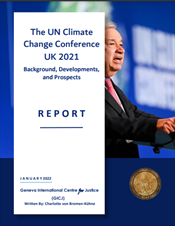The UN Climate Change Conference - UK 2021 : Background, Developments, and Prospects
By: Charlotte von Bremen-Kühne
The Glasgow Pact – the climate agreement that has been concluded at the end of COP26 – is just about a month old and as first evaluations, criticism, and analyses of the final results emerge, we begin to understand what legacy COP26 has left us with.
Geneva International Centre for Justice (GICJ) has followed events during the fortnight of the climate summit and now presents a report about the background, the development, and the prospects of COP26, covering the following questions:
- What happened prior to COP26? What was expected of this summit and why was 2021 different to other years?
- How does climate change affect human rights? What is the UN’s role regarding the issue of climate change, and more specifically the issue regarding human rights violation caused by climate change?
- Against this backdrop, what are the key results of COP26? Did COP26 take into account the correlation between climate change and human rights? Is the Glasgow Pact fit for purpose?
COP26 was certainly distinct from its predecessors as 2021 has been regarded as the ‘make or break’ year. This is primarily due to this year’s severe weather events, such as flooding, wildfires, and heat waves, whilst the IPCC has contributed to the rising awareness about the devastating impacts climate change has on both the environment and humans when it released its report this summer.
At least since the Human Rights Council acknowledged a clean, healthy and sustainable environment to be a human right, it is now uncontested that climate change and human rights are subjects that cannot be viewed in isolation.
Despite the pressing set of facts regarding the adverse effects of global warming and changing climate, COP26 ended with mixed results. Although there have been considerable pledges and agreements, and a general shift in the right direction could be sensed, it appears that the climate is changing faster than governments are acting in order to mitigate and adapt. We must not exceed the 1.5°C limit, but unfortunately, COP26 did not result in a strong mutual commitment to achieve this goal by a certain date.
While this COP26 might be regarded as better than previous COPs or even as ‘good’, this might not be ‘good enough’. It remains to be seen if states keep their word and implement their pledges. Since the Glasgow Pact falls short of what is needed to be done to effectively avert negative implications of climate change, it is on states to fulfil and go beyond their commitments in order to ensure the protection of the environment, and ultimately human rights.

Click here to read the full report in English







